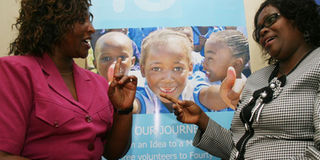Focus on girl child education, group urges

Girl Child Network chairperson Agnes Leina (left) confers with GCN's Executive Director Mercy Musoni (right) March 21,2013 during a breakfast meeting at Intercontinental Hotel, Nairobi. The group said the new County Directors of Education should pay special focus on the schooling of the girl child. WILLIAM OERI
The new County Directors of Education should pay special focus on the schooling of the girl child, a rights organisation has said.
Girl Child Network deputy director Florence Annan Thursday said the gap between the number of girls who enrol for school and eventually sit final national examinations should be narrowed.
“As much as girls are encouraged to enrol to primary school, there is the issue of how they move to get secondary education,” she said after presenting their five-year strategic plan to donors in a meeting held in Nairobi.
The organisation wants the government to turn its focus to girls living in arid and semi-arid areas.
“We want to ensure that the County Government is strengthened enough to deal with issues relating to their strategic plans and especially gender concerns around education,” Ms Annan said.
She said the group has been working with communities from such areas to support girl child education initiatives and fight retrogressive cultural practices.
“We believe that education is the greatest tool and if the girl is educated, then some of the issues we address concerning health and gender based violence can be minimised,” she said.
“As long as these indicators are prevalent, then the development process in Kenya is yet to be achieved and Vision 2030 remains a dream.”
Through the partnership of the government, GCN has seen a 15 per cent increase in enrolment of girls in Kajiado schools and recorded a 17 per cent increase in girls’ transition to secondary schools in Tana River District since 2009.
Also in Tana River, the dropout rate for girls in the GCN project schools has gone down from six per cent to two per cent between 2011 and 2012.
The statistics from the organisation further revealed that dropout cases related to pregnancy reduced from 22 per cent to 13 per cent while those associated to early marriages went down by 41 per cent in the project schools.
“Free Primary Education focused on enrolment and now we want to look beyond that to the totality of quality education on issues such as co-curricular activities and a favourable learning environment,” Ms Annan stated.




